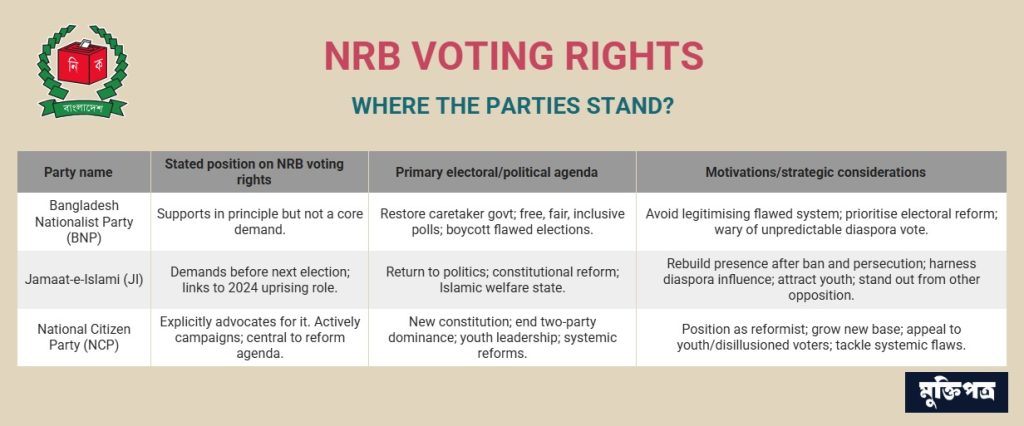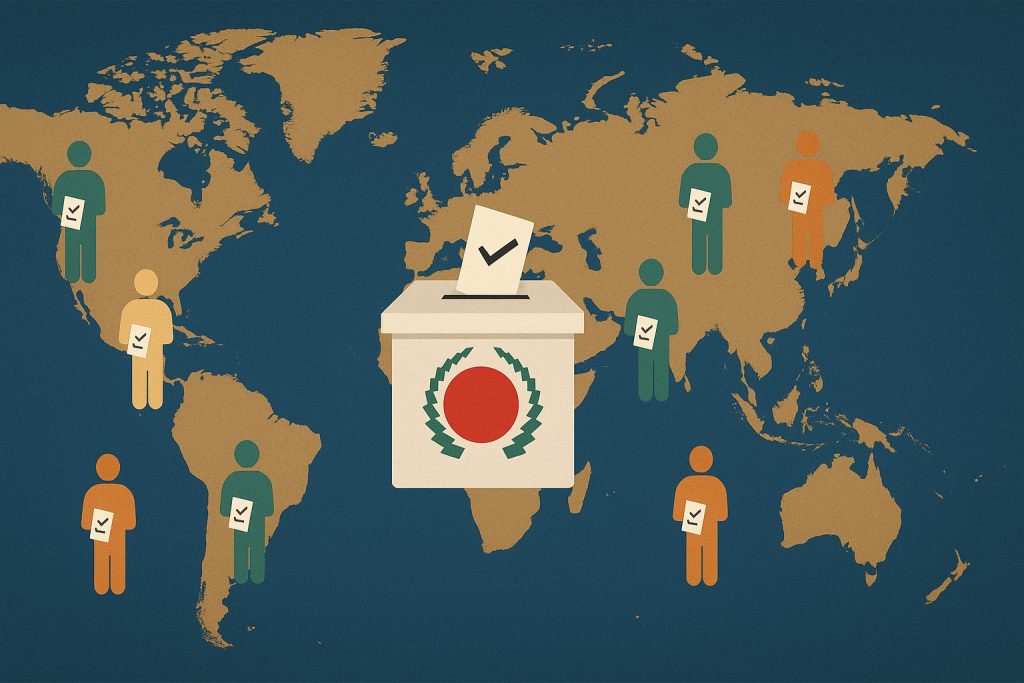Bangladesh’s diaspora sent home over $30 billion last year, played a pivotal role in the 2024 uprising, and yet remains disenfranchised. As the NCP fights for their voting rights, why are BNP and Jamaat still sitting on the fence?
Later this month, the chief election commissioner will visit Canada to inaugurate a voter registration and NID issuance programme there. A high-tech rollout and weeklong engagement events with voters is on the books. This appears to be the latest step in the interim government’s push to enfranchise immigrant Bangladeshis. In April, the Election Commission hosted an event with the IT industry leaders, academia and other stakeholders where an ambitious roadmap was laid out for diaspora voter registration and voting. The proposals included both online and IT-assisted postal voting. Now we will discuss shortly the scale of the challenge the EC faces in this project, but the more pertinent question today is the political will behind this, or lack thereof.
In the age of hyper-connected politics and a globalised electorate, silence is no longer a neutral stance—it is complicity. Nowhere is this more apparent than in the ongoing debate around the political rights of Non-Resident Bangladeshis (NRBs). Despite their record-breaking economic contributions, growing political consciousness, and the instrumental role during key national crises, NRBs remain largely disenfranchised in Bangladesh’s electoral system.
So now, seeing this new political force — the National Citizen Party — emerging from the embers of a mass uprising and placing NRB voting rights at the heart of its reformist platform, the question that comes to my mind is: Where are the Bangladesh Nationalist Party (BNP) and Jamaat-e-Islami (JI)? If the NCP, still in its infancy and lacking any deep-rooted political machinery, can take a bold, unequivocal stand on diaspora enfranchisement, why can’t BNP and JI—the supposed champions of reform and opposition?
THE POLITICAL ECONOMY OF THE FORGOTTEN VOTER
To understand the magnitude of the issue, consider the numbers. The Bangladeshi diaspora, estimated to be between 7.5 and 13 million strong, sent home a record $30.33 billion in remittances in FY2024-25 alone. That’s not just money—that’s the bloodline of our foreign reserves, a hedge against economic uncertainty, and a direct injection into rural households and development initiatives.
And yet, this group remains politically voiceless. Despite legal provisions that nominally allow overseas voting, logistical hurdles and legal ambiguities render those rights moot in practice. The Election Commission’s efforts to implement online and hybrid voting have been stalled by systemic distrust, technical constraints, and—most critically—a lack of political will.
This is where party politics matters. Without political pressure, institutional inertia triumphs. And when established political parties fail to advocate for the rights of NRBs, they effectively treat millions of Bangladeshis as second-class citizens.
NCP: A BLUEPRINT FOR POLITICAL COURAGE
The National Citizen Party is not just another student movement that fizzled into irrelevance. Formed in the wake of the 2024 July Revolution and officially registered in early 2025, the NCP represents a new kind of politics—one grounded in inclusivity, structural reform, and a generational break from the duopoly of Awami League and BNP.
Their stance on NRB voting rights is clear, consistent, and bold. They view diaspora enfranchisement as integral to their broader push for a “second republic” and political justice. They participated in the EC seminars on diaspora voting, directly engaged with policy discussions, and publicly criticised the lack of reform-minded consensus among legacy parties. In doing so, they have demonstrated that commitment to democratic reform is not just rhetorical—it’s operational.
The NCP’s principled advocacy should be a wake-up call to older, more established players. If a new, untested party can integrate diaspora rights into its core platform, the silence of BNP and JI becomes indefensible.
JAMAAT-E-ISLAMI: A START, BUT IS IT SINCERE?
To its credit, Jamaat has recently broken its silence. Following its re-registration as a political party in June 2025, after more than a decade of legal and political limbo, JI’s Amir, Drs Shafiqur Rahman, explicitly called for NRB voting rights, citing the diaspora’s role in the 2024 uprising as a rationale. This was a rare moment of strategic alignment between words and context.
But one public statement does not a platform make. JI’s call for voting rights, though welcome, risks appearing opportunistic—an attempt to re-ingratiate itself with a reform-hungry electorate following years of pariah status. What is missing is a comprehensive roadmap: Where is JI’s legislative proposal? Where is its push in cross-party forums? Where is its outreach to diaspora communities?
If Jamaat is serious, it must go beyond rhetoric. Otherwise, its advocacy risks being dismissed as a hollow attempt at political rehabilitation.
BNP: THE ELEPHANT THAT WON’T SPEAK
The most glaring omission, however, is the BNP. The party that once formed governments, established the Ministry of Expatriate Welfare, and has long claimed to champion “people’s voting rights,” has remained mostly mute on the specific issue of NRB enfranchisement. Their reasoning, at least on paper, is strategic: pushing for NRB voting would amount to legitimising an electoral system they believe is broken. BNP’s central demand for a neutral caretaker government takes precedence, they argue, over partial reforms like diaspora voting.
But here’s the problem with that logic: rights are not mutually exclusive. One can advocate for systemic reform while also demanding specific improvements that bring us closer to electoral justice. To pretend otherwise is disingenuous.
Moreover, by failing to speak up for NRBs now, BNP risks alienating a powerful, motivated, and increasingly politicised voter bloc. If BNP truly believes in “restoring people’s voting rights,” it cannot cherry-pick which people it deems worthy.

THE MYTH OF POLITICAL RISK
Some might argue that the reluctance of BNP and JI is rooted in electoral calculus: why invest political capital in a dispersed, logistically challenging, and unpredictable voter base? But that’s precisely the kind of outdated thinking that alienated millions of young, urban, and overseas voters in the first place.
The July 2024 mass uprising proved that NRBs are not passive ATM machines. Many strategically withheld remittances in solidarity with the domestic protests, only releasing funds after the government transition. That’s not just economic clout—it’s political agency. Ignore it at your peril.
The diaspora is watching. They are organising, donating, lobbying, and increasingly influencing political narratives back home. Political parties that fail to engage them now will find themselves playing catch-up later.
IT’S NOT JUST ABOUT THE VOTE
At stake is more than a ballot paper. This is about recognition, dignity, and the right to be seen as a full citizen. The diaspora has supported Bangladesh during its darkest and brightest moments—from funding the Liberation War to shaping global opinion on domestic crises. They are not fringe actors; they are core stakeholders.
The fact that the diaspora must plead for a right that should be theirs by default is a stain on the conscience of our political establishment. And the fact that only one party—NCP—has unequivocally stepped up to advocate for that right should be an embarrassment to the others.
TIME TO CHOOSE
So, if NCP can ask for NRB voting rights, why not BNP and JI?
Is it fear of unpredictability? Is it political inertia? Or worse, is it a belief that overseas Bangladeshis do not matter?
Whatever the reason, it is no longer acceptable. The road to April 2026 elections is being paved now. The Election Commission has asked for political consensus. The diaspora has shown its willingness to act. The legal groundwork, though complex, can be clarified. The only missing ingredient is political courage.
So here is the call: BNP and JI must issue formal, detailed policy positions on NRB voting. They must demand legislative amendments, propose technical solutions, and engage directly with diaspora stakeholders. Anything less is evasion.
In the end, this is not just about who wins the next election. It’s about what kind of democracy Bangladesh wants to be. One that leaves millions behind—or one that finally lives up to the promise of inclusivity.
The choice is clear. The time is now.
Adil Mahmood is a former journalist, himself an NRB.


